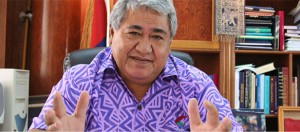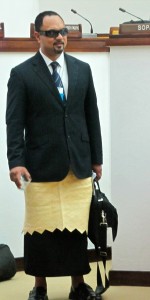
Islands on the Edge – Together
September 2nd, 2014
A few weeks ago, I attended the annual meeting of the International Seabed Authority (ISA) for a day. It was a celebration of the ISA’s twentieth anniversary, and the meeting was in celebratory mood. As I stepped into the conference room, I was immediately fascinated by a representative from the Asia-Pacific Group, standing by the water cooler. Yes, I must admit it was because he was wearing traditional dress and looking quite marvelous. In fact, that Group was among the most vocal during the day; the Asia-Pacific officials’ contributions were certainly among the most eloquent, even impassioned. One representative from Fiji made a remark that resonated with me. What they want above all, he said was “Peace. Development. Co-operation.”
Isn’t this what we are all searching for?
Well, now an even larger meeting has begun on one of those very islands, scattered like tiny jewels across the Pacific Ocean. Although the gathering is so far away, it has great significance for Jamaica, because we are all Small Island Developing States (the rather ugly acronym is SIDS). The Third International UN Conference on SIDS opened on September 1 in Apia, Samoa and through the marvels of modern technology can be watched live on UN Web TV (webtv.un.org).
The theme of the conference is “Island Voices, Global Choices.” Is this a nice little catch-phrase, or does it mean something? What are the real choices for SIDS like Jamaica and the thousands of other islands across the globe, in the face of climate change, economic pressures and declining resources? The aim of the Conference is to ensure “The sustainable development of small island developing States through genuine and durable partnerships.” These words may sound like the usual development-ese – a language that sounds great, but has to be translated – but I sensed in this stated aim a touch of urgency. We all love partnerships, but what about “genuine and durable” relationships? Those are harder to forge. Besides this, the UN General Assembly has called for “a concise, focused, forward-looking and action-oriented political document.”
In other words: Let’s get serious. There is no time to lose. We must think long-term. Look to the future. We must work together, whether we like or not. Let us concentrate. No more waffling and political rhetoric. Let’s get cracking and get things done. And did I say time is running out?
We would love all our leaders back home to take this advice, wouldn’t we? As far as this brief meeting on an idyllic Pacific island goes, of particular interest to me are the multi-stakeholder partnership dialogues on several pressing issues. Who are all the partners? Well, the many people who were unable to attend the conference, NGOs, private sector, bilateral and multilateral partners, and more. You can find the partnership platforms listed here – an impressive list, indeed, and worth a browse through: http://www.sids2014.org/index.php?menu=1507

The Prime Minister of Samoa, the host country, has a wonderful name: Tuilaepa Lupesoliai Sailele Malielegaoi. Don’t ask me to pronounce it!
What is the Caribbean most concerned with here? Well, I will briefly outline the major areas. Jamaicans are talking about these issues every day in one way or another. We know they are important.
Connectivity, especially in times of natural disaster. Jamaica and the Caribbean are better off in this respect than the Pacific islands, almost half of which have no basic telecommunications. Our Office of Disaster Preparedness and Emergency Management has been coming up with some creative strategies. Then there is the “broadband divide.” This emerging gap needs to be bridged to ensure much wider access to information and better communication in whatever difficult times lie ahead, across society and including our most vulnerable populations.
And what about that big word – water? The media houses like to call it “the precious commodity.” This year, as never before, we have realized here in Jamaica how precious it is.”Water is life” is no longer a cliche, when you are a small farmer standing in a dry, empty field stricken by drought; or when you are trying to bathe a sick relative at home; or when your child is thirsty in the heat of midsummer. So, partnerships on water and wastewater management are high on the priority list. One great example of South-South co-operation is a new project called Cultivando Agua Boa (Cultivating Good Water) in the Dominican Republic, with support from Brazil, Bolivia and Guatemala. I hope we see more of these.
Sustainable development is a popular phrase these days. It covers such a multitude of areas, including renewable energy. We know we are far too dependent on fossil fuels. As you may have heard recently, the Germans are actively working with Jamaica and elsewhere in the Caribbean in this area, and their support is welcomed. I believe it’s largely a matter of changing people’s hearts and minds – especially those of our leaders. We need to shake ourselves out of the old ways of thinking and behaving – and now!
And a plea for our precious oceans. We are so dependent on them. The wealth of life within them is threatened by poor coastal developments, industrial and agricultural pollution, and our own human waste and garbage. Ocean ecosystems such as our once flourishing coral reefs are already suffering from climate change, with acidification being one of the major symptoms. And we humans are making the situation a whole lot worse, destroying our mangrove forests and over-fishing. Let’s stop and look at some better ways of doing things.
Climate change is way up there on everyone’s agenda, these days, and with good reason. A draft UN report, “leaked” to the media a few days, gives the most alarming prognosis yet. The changing climate will likely have “severe, pervasive and irreversible impacts for people and ecosystems,” says the UN Intergovernmental Panel on Climate Change in the report. Yes. Irreversible. This is not one of those things we can put off to another day. The time is now.
By the way, I hope that we will soon hear about Jamaica’s involvement in the Ten Island Renewable Challenge, which was activated by the Carbon War Room and the Rocky Mountain Institute on Sir Richard Branson’s Necker Island in the Caribbean in February of this year. The British Virgin Islands, Colombia, Dominica, Saint Kitts & Nevis, Saint Lucia, Aruba and Turks and Caicos are already on board. Sir Richard launched the Challenge – a way of jump-starting a serious move towards renewable energy in the Caribbean – in June 2013 at the Rio+20 Summit.
Jamaica must – must – seize these opportunities for a brighter future. Even with our stumbling, bumbling bureaucracy, we must keep moving forward into the future. And with alacrity.
I hope this gave you a useful overview of the huge and pressing issues affecting our islands in the Caribbean, and all our global island neighbors. We share many of the same concerns – not least of them, the rising oceans, storms and other reminders that climate change is already here, with us. We are living with climate change now. Our health, our children, the status of our women, the crops we grow, our fisheries – all are affected. We are inextricably linked.
We need to set aside the pettiness, the partisan politics, the parochialism and silly divisive discourse over the same trivialities that are of passing significance. These are the real issues that we must focus on. Let’s keep our leaders focused on them, too. Then, and only then, we might make some progress – together.
As the representative from Fiji said: Peace. Development. Co-operation.
So let’s move forward, bravely, into an uncertain future.

A representative of Fiji from the Asia-Pacific Group at the International Seabed Authority meeting in Kingston on July 22, 2014. (My photo)
Tags: biodiversity, Carbon War Room, Caribbean, International Seabed Authority, Jamaica, Kingston, Necker Island, oceans, Pacific, renewable energy, Samoa, Sir Richard Branson, Small Island Developing States, Ten Island Renewable Challenge, water resource management
The Gleaner reserves the right not to publish comments that may be deemed libelous, derogatory or indecent.
To respond to The Gleaner please use the feedback form.
2 Responses to “Islands on the Edge – Together”
- We Are the Zoomers
- Living Online with Humans and Birds: NAOC 2020
- Human Trafficking and the Problem of Public Education
- Down Memory Lane
- Are We Ready to Recover from COVID-19?
- Road Safety Matters: Is Your Vehicle Safe?
- Sexual Harassment, Me Too, and the Minister’s Disturbing Giggle
- The Vulnerable Senior Citizens, Private Care Homes and COVID-19
- A Muddle Over Masks
- Here is Something Life-Saving You Can Do: Give Blood!




Interesting read… Peace. Development. Cooperation.
Thanks! Yes, those three words really struck me – I wrote them in large letters on my notepad!